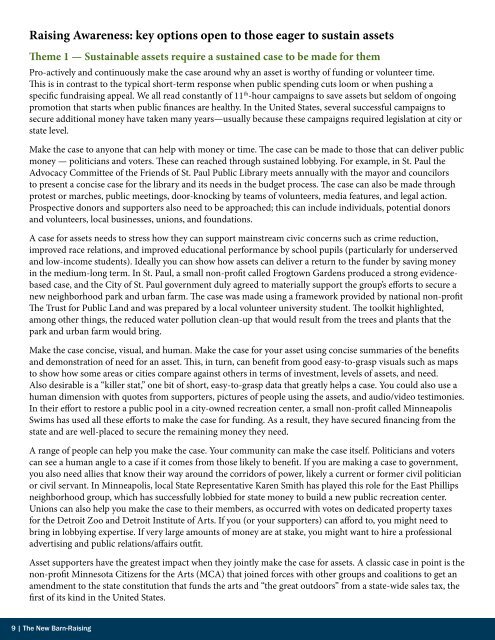bQNs7mR
bQNs7mR
bQNs7mR
You also want an ePaper? Increase the reach of your titles
YUMPU automatically turns print PDFs into web optimized ePapers that Google loves.
Raising Awareness: key options open to those eager to sustain assets<br />
Theme 1 — Sustainable assets require a sustained case to be made for them<br />
Pro-actively and continuously make the case around why an asset is worthy of funding or volunteer time.<br />
This is in contrast to the typical short-term response when public spending cuts loom or when pushing a<br />
specific fundraising appeal. We all read constantly of 11 th -hour campaigns to save assets but seldom of ongoing<br />
promotion that starts when public finances are healthy. In the United States, several successful campaigns to<br />
secure additional money have taken many years—usually because these campaigns required legislation at city or<br />
state level.<br />
Make the case to anyone that can help with money or time. The case can be made to those that can deliver public<br />
money — politicians and voters. These can reached through sustained lobbying. For example, in St. Paul the<br />
Advocacy Committee of the Friends of St. Paul Public Library meets annually with the mayor and councilors<br />
to present a concise case for the library and its needs in the budget process. The case can also be made through<br />
protest or marches, public meetings, door-knocking by teams of volunteers, media features, and legal action.<br />
Prospective donors and supporters also need to be approached; this can include individuals, potential donors<br />
and volunteers, local businesses, unions, and foundations.<br />
A case for assets needs to stress how they can support mainstream civic concerns such as crime reduction,<br />
improved race relations, and improved educational performance by school pupils (particularly for underserved<br />
and low-income students). Ideally you can show how assets can deliver a return to the funder by saving money<br />
in the medium-long term. In St. Paul, a small non-profit called Frogtown Gardens produced a strong evidencebased<br />
case, and the City of St. Paul government duly agreed to materially support the group’s efforts to secure a<br />
new neighborhood park and urban farm. The case was made using a framework provided by national non-profit<br />
The Trust for Public Land and was prepared by a local volunteer university student. The toolkit highlighted,<br />
among other things, the reduced water pollution clean-up that would result from the trees and plants that the<br />
park and urban farm would bring.<br />
Make the case concise, visual, and human. Make the case for your asset using concise summaries of the benefits<br />
and demonstration of need for an asset. This, in turn, can benefit from good easy-to-grasp visuals such as maps<br />
to show how some areas or cities compare against others in terms of investment, levels of assets, and need.<br />
Also desirable is a “killer stat,” one bit of short, easy-to-grasp data that greatly helps a case. You could also use a<br />
human dimension with quotes from supporters, pictures of people using the assets, and audio/video testimonies.<br />
In their effort to restore a public pool in a city-owned recreation center, a small non-profit called Minneapolis<br />
Swims has used all these efforts to make the case for funding. As a result, they have secured financing from the<br />
state and are well-placed to secure the remaining money they need.<br />
A range of people can help you make the case. Your community can make the case itself. Politicians and voters<br />
can see a human angle to a case if it comes from those likely to benefit. If you are making a case to government,<br />
you also need allies that know their way around the corridors of power, likely a current or former civil politician<br />
or civil servant. In Minneapolis, local State Representative Karen Smith has played this role for the East Phillips<br />
neighborhood group, which has successfully lobbied for state money to build a new public recreation center.<br />
Unions can also help you make the case to their members, as occurred with votes on dedicated property taxes<br />
for the Detroit Zoo and Detroit Institute of Arts. If you (or your supporters) can afford to, you might need to<br />
bring in lobbying expertise. If very large amounts of money are at stake, you might want to hire a professional<br />
advertising and public relations/affairs outfit.<br />
Asset supporters have the greatest impact when they jointly make the case for assets. A classic case in point is the<br />
non-profit Minnesota Citizens for the Arts (MCA) that joined forces with other groups and coalitions to get an<br />
amendment to the state constitution that funds the arts and “the great outdoors” from a state-wide sales tax, the<br />
first of its kind in the United States.<br />
9 | The New Barn-Raising


